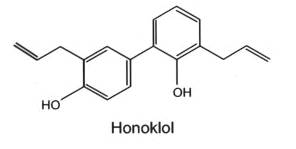| Product Name: | Honokiol | |
| Product Type: | Pure Plant Extracts | |
| Usage: | a treatment option for anxiety, cancer, peridontal disease, stroke, inflammation, and even weight loss. | |
| Clicks: | 222 | |
| Release Time: | 2010-05-19 | |
| Introduction | ||
|
Name: Honokiol IUPAC name: 2-(4-hydroxy-3-prop-2-enyl-phenyl)- 4-prop-2-enyl-phenol Other names: houpa, hnk CAS number :35354-74-6 Molecular formula :C18H18O2 Molar mass :266.334 g/mol Appearance :White solid Solubility in water: sparingly (25 °C) Molecular Structure:
A compound found in magnolia species holds exciting promise in the management of anxiety, cancer, and other challenging conditions. Honokiol is a bi-phenolic compound with the formula C18H18O2 and a relatively small molecular weight of 266 grams/mole. This molecule is found in several species of the genus magnolia including M. officinalis, obovata, and grandifolia. It is an isomer of another compound also found in magnolia materials called magnolol, which has 1000 times the antioxidant potential of vitamin E. The dried bark of M. officinalis usually has Magnolia Species and Traditional Use While magnolia species have been incorporated in traditional healing systems throughout the world, the barks of Chinese M. officinalis and Japanese M. obuvata have become quite popular due to their verified levels of phytochemicals like honokiol. The bark of M. officinale (houpa) is often sought for incorporation in traditional Chinese formulas addressing “chi stagnation”, asthma, anxiety, cancer, and digestive disorders. China produces well over 200 tons of magnolia bark a year. With its popularity comes the concern of over-harvesting since the tree is killed during bark procurement. A positive side to this is that the honokiol molecule is not very complex and is easily synthesized through organic chemistry methods. Pharmokinetics Honokiol appears to be non toxic, easily absorbed, and systematically available. This is Recent studies have explored honokiol and found validation for it as a treatment option for anxiety, cancer, peridontal disease, stroke, inflammation, and even weight loss. |
||





 The company profile was verified by
The company profile was verified by 









